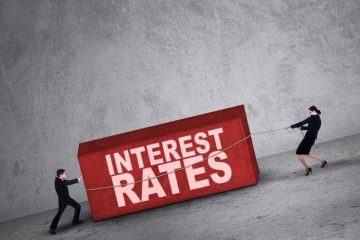It Rarely Pays to Be Pessimistic
“Through all its vicissitudes and casualties, as earthshaking as they were unforeseen, it remained true that sound investment principles produced generally sound results. We must act on the assumption that they will continue to do so.”
-Benjamin Graham
During the past few years, many people have consistently expressed a more pessimistic view of the economy. They have been anticipating all kinds of negative casualties, such as the debt ceiling problem, the U.S. government fiscal problem, or some other shock to the economy. We have also witnessed almost unprecedented uncertainty. Remember the volatile summer of 2011 when the U.S. seemed to be heading into a double dip, when European’s mess seemed like it could only get worse? Remember the Japanese Tsunami? China’s possible hard landing?
And now we have the Ukraine crisis, which looks like a serious issue. The economy is still not galloping. Befuddled, someone posted the following:
“GDP miss. Fed pulls back $ 10 billion. Market? Up. What the hell, market. Get it together.”
Fascinating, isn’t it?
What’s more fascinating is that there are quite a few renowned economists and fund managers who have been bearish since the financial crisis. John Hussman (Trades, Portfolio) is the perfect example. He wrote an article called “the Stock Market Has Never Been This Overbought” back in October 2009. Between 2009 and April 2014, he wrote numerous commentary articles; almost each one of them laid out a problem. He has been claiming that the U.S. stock market is “overvalued, overbought and overbullish.”
Similarly, Charlie Minter and Marty Weiner from the Comstock Partners have been raising the red flags for a long time. They are as bearish as John Hussman (Trades, Portfolio).
The list of perma-bears can go on and on. The most interesting thing is that what the bears have been saying is probably true. All the scary warnings and potential scenarios that may unfold in the future are not based on lousy thinking — they are based on, in my view, very sound analysis. But if you have followed the investment advice from them, your investment results would have been less than satisfactory. So here is the paradox: The perma-bears are right in terms of analyzing the problems we have, but in light of these problems, U.S. stocks have continued to do well. Why is that?
Well, if you look at the background of those perma-bears, you will notice that most of them share a background in macroeconomics. Therefore, they look at things from a macro perspective. Nothing wrong with that. Macroeconomics is important and we need to pay attention to macros.
But macroeconomics has its limitations, which Yogi Berra shrewdly pointed out as a baseball player: “In theory there is no difference between theory and practice. In practice there is.” This is why macroeconomics is full of surprises, and this is why value investors tend to shun macro forecasts.
Macroeconomics aside, I think the problem with the perma-bears lies in the fact that they often ignore human potential. The capitalist system in the U.S. works so well that it can unleash an enormous amount of human potential. Everyday, there are some people in this country that try to perform the same tasks in a faster and better way. When they find a way to do things better and faster, they get rewarded. The American Capitalist system promotes creativity and productivity, amid all the macroeconomic problems. This remarkable characteristic of the system is the reason stocks have performed well amid all the uncertainties and casualties.
As Chuck Akre (Trades, Portfolio) has pointed out in his presentation at the Value Investor Conference, American businesses have earned approximately 10% return on capital over the past 75 to 100 years, during which we had world warss, oil embargos, terrorist attacks, cold wars, etc. If American businesses continue to earn low double-digit or high single-digit returns on equity, stocks will do just fine. You can be right about the occurrence of horrible events but if you are permanently pessimistic about the stock market, you will most likely not do well.
So here we are today, still facing many problems. First of all, Warren Buffett said in a CNBC interview that the Fed has sown a lot of seeds for inflation. It’s easy to sow the seeds, and it will be extremely hard to unsow the seeds. And we all know what inflation and high interest rates can do for stock markets. It is a real concern, but no one knows the possibility and when.
Another concern is China. We have seen signs of collapse of the real estate market in China. The Chinese economy is slowing down. China is also going through a massive rebalancing, and that has huge implications for American multi-national companies. Again, no one can predict what will happen, but the result is more likely to be ugly than pretty.
Furthermore, the geopolitical, nuclear, chemical and cyber risks are all real. It is scary to think about the implications.
Even with all the above problems and a ultra-low interest rates, I think Mr. Buffett is right – stocks are probably fairly valued. And if I look out 10 years from now, I can’t see any reason why the U.S. economy is not better than it is today. It seems obvious to me that the standard of living will be higher, corporate profits will be higher, and American businesses will continue to do well with a few hiccups on the way.
In the end, you may ask, as investors, what should we do given what we have learned from history, and given the unknowable future?
My answer is simple: It rarely pays to be pessimistic. So be optimistic, but proceed with caution.


